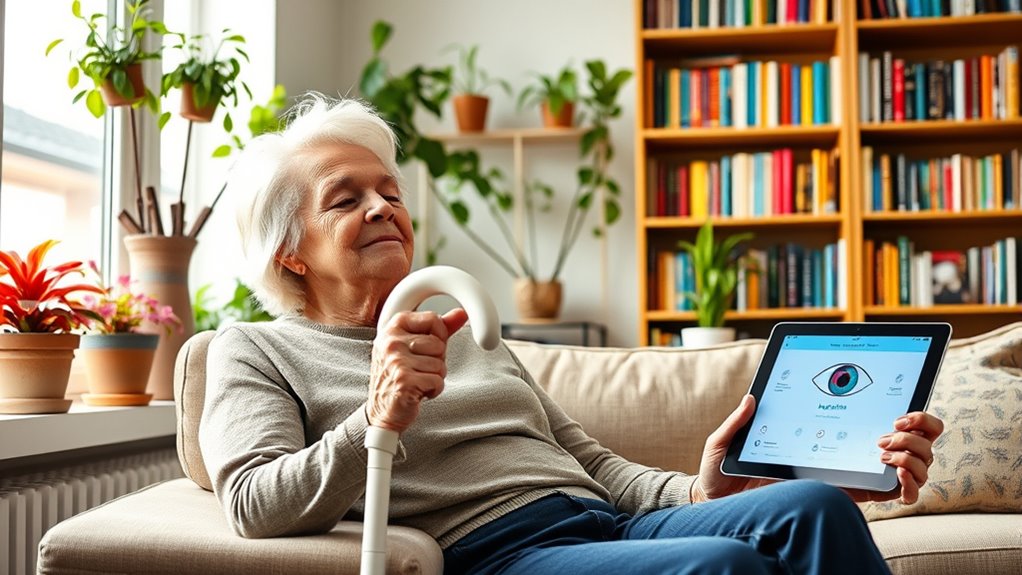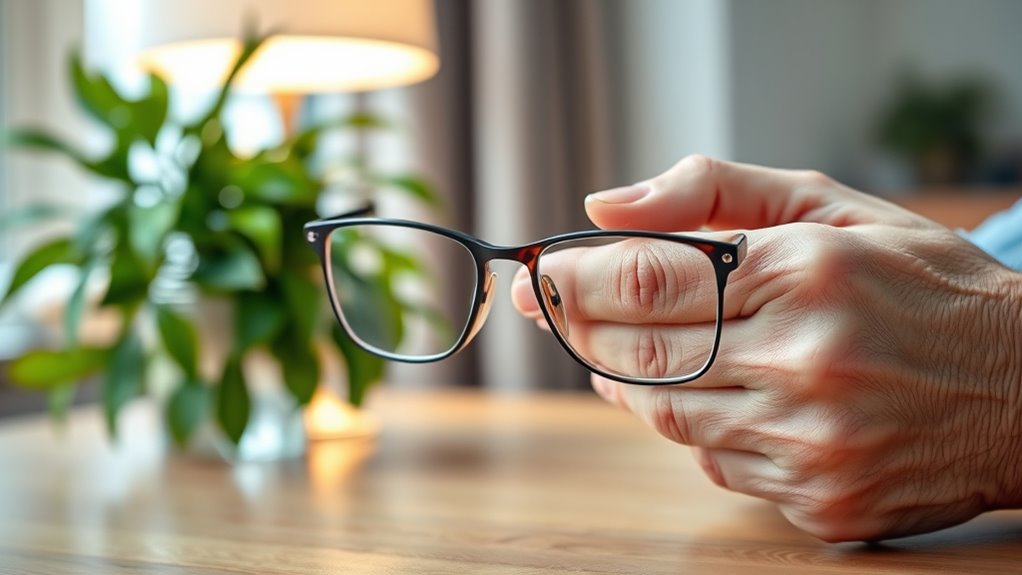To protect your vision as you age, focus on early detection and management of common eye conditions like AMD, glaucoma, and cataracts by scheduling regular eye exams. Adopt healthy habits such as eating a balanced diet rich in nutrients, wearing UV-protective sunglasses, and quitting smoking. Managing health issues like diabetes also helps preserve sight. Staying informed about protective strategies can make a significant difference—keep exploring to discover more ways to support your eye health.
Key Takeaways
- Schedule regular eye exams to detect and manage age-related eye conditions early.
- Maintain a healthy diet rich in vitamins A, C, E, omega-3s, lutein, and zeaxanthin.
- Wear UV-protective sunglasses and hats to shield eyes from harmful ultraviolet rays.
- Manage chronic health issues like diabetes and hypertension to reduce eye disease risks.
- Practice good digital habits, including limiting screen time and using blue light filters to prevent eye strain.
Understanding Common Age-Related Eye Conditions

As you age, your eyes become more susceptible to certain conditions that can affect your sight. Age-related macular degeneration (AMD) damages the central part of your retina, making it hard to read or recognize faces. About 1.8 million Americans aged 40+ currently have AMD, with the risk rising as you get older. Glaucoma, known as the “silent thief of sight,” damages your optic nerve without early warning signs, and affects around 2.2 million people over 40. Cataracts cause clouding of your lens, leading to blurred vision, and are highly treatable through surgery. Diabetic retinopathy results from high blood sugar damaging retinal blood vessels, threatening your vision if unmanaged. Recognizing these conditions early can help you take steps to protect your sight. Additionally, understanding the contrast ratio of your vision can help you better assess how these conditions may impact your ability to see clearly in different lighting environments. Maintaining overall eye health through proper nutrition and regular check-ups can also preserve your vision, and being aware of the self-care practices that support eye health is essential.
Key Strategies for Maintaining Eye Health

Maintaining your eye health as you age involves adopting practical strategies that support good vision and prevent common problems. Eating a balanced diet rich in vitamin A, omega-3 fatty acids, lutein, zeaxanthin, and vitamins C and E helps protect your eyes from damage and supports ideal function. Heartfelt wishes Wearing sunglasses with UV protection and wide-brimmed hats shields your eyes from harmful rays, reducing the risk of cataracts and macular degeneration. Quitting smoking and managing health conditions like diabetes and hypertension lower the chances of developing eye issues. Staying hydrated and limiting screen time help prevent dry eyes and eye strain. Additionally, ensuring proper lighting, taking regular breaks, and using blue light filters can greatly maintain your eye comfort and overall vision health as you age. Incorporating nutritional considerations can further enhance your eye health and support long-term vision. Developing eye health habits early on can also contribute to long-term visual clarity and comfort.
The Importance of Regular Eye Examinations

Have you ever wondered how often you should get your eyes checked? Regular eye exams are vital because they can prevent up to 80% of blindness cases by catching issues early. Many eye diseases have no warning signs, so routine exams are essential for early detection. During these checkups, your eye doctor can also identify other health problems like diabetes or hypertension. The NHS recommends seeing an eye specialist at least once every two years, but your personal risk factors—like age, family history, or existing health conditions—may require more frequent visits. Incorporating professional equipment and expert analysis ensures accurate diagnoses. Advances in AI in Education can also support early detection and personalized eye care strategies, making these exams even more effective. Regular monitoring with diagnostic tools can help track changes in your vision over time and alert you to potential issues sooner. Additionally, the integration of AI-powered diagnostics is transforming eye care by providing more precise and early diagnoses, ultimately helping to protect your vision as you age. Staying informed about latest technology in ophthalmology allows for better preventative care and treatment options. Prioritizing these checkups keeps your eyes healthy and guarantees your vision stays clear as you age.
Lifestyle Choices That Support Vision Preservation

Living a healthy lifestyle plays an essential role in preserving your vision as you age. First, focus on a diet rich in omega-3 fatty acids and antioxidants like leafy greens and berries. These nutrients help reduce inflammation and protect your eyes from oxidative stress. Avoid smoking, as it’s linked to multiple eye diseases, including cataracts and AMD. Regular physical activity boosts your overall health and lowers the risk of conditions that impair vision. Protect your eyes from UV exposure by wearing sunglasses and hats outdoors. Stay well-hydrated and get enough sleep to prevent dry eyes and maintain eye comfort. Limiting screen time and managing blue light exposure can also reduce eye strain, helping to preserve your vision over time. Additionally, staying informed about AI safety measures and potential vulnerabilities can contribute to a safer digital environment, indirectly supporting eye health by reducing stress and exposure to harmful digital content. Incorporating eye protection strategies into your daily routine is also beneficial for long-term eye health. Maintaining awareness of retirement planning principles can also help you manage stress and financial security, which are important for overall well-being. Furthermore, understanding nutritional benefits of certain foods can enhance your dietary choices to better support your eye health. Regular eye check-ups and staying updated on analytical cookies can help detect early signs of eye conditions, ensuring timely intervention.
Resources and Support for Those With Vision Loss

If you’re experiencing vision loss, numerous resources and support systems are available to help you adapt and maintain your independence. Organizations like the National Federation of the Blind and the American Foundation for the Blind offer advocacy, research, and access to assistive technologies. Community support and advocacy groups, such as the American Association for People with Disabilities, work to influence policy and provide social support. Financial assistance through Medicaid, Medicare, and employer-sponsored insurance can help cover eye care costs, though uninsured individuals face barriers. Access to specialized vision care, ophthalmology services, and assistive technology is tracked through programs and data sources like VEHSS and IRIS Registry. Vetted – My Dogs’ Names These resources empower you to navigate vision loss confidently and access the support you need. Additionally, understanding the technical aspects of emailing can help organizations communicate effectively with those they serve, ensuring vital information reaches the intended audiences. Staying informed about exclusivity and access to high-quality services can further enhance your ability to maintain a luxurious lifestyle while managing vision challenges. Moreover, being aware of the financial aspects involved in eye care can help you plan and secure necessary resources more effectively. Incorporating mindset shifts and vibrational alignment, as emphasized in the Law of Attraction, can also support a positive outlook and resilience during your journey with vision loss.
Frequently Asked Questions
Are There Any New Treatments for Age-Related Macular Degeneration?
Yes, there are new treatments for age-related macular degeneration (AMD). You might see options like Eylea HD, which offers longer intervals between injections, or IZERVAY, approved for geographic atrophy in dry AMD. Researchers are exploring gene and stem cell therapies, aiming to slow or stop disease progression. These advancements could lead to more effective, personalized, and less burdensome treatments, improving your vision and quality of life.
How Does Genetics Influence My Risk of Age-Related Eye Conditions?
Imagine your eyes as a delicate garden, where genetics are the seeds shaping your landscape. Your family history and specific gene variants influence whether this garden is prone to conditions like AMD. While you can’t change your genes, you can tend to your environment—avoiding smoking and maintaining good health—to protect your vision. Understanding your genetic risks helps you stay proactive, catching issues early before they threaten your sight.
Can Vision Loss Be Completely Prevented With Lifestyle Changes?
You wonder if lifestyle changes can fully prevent vision loss. While adopting healthy habits like eating nutrient-rich foods, exercising regularly, quitting smoking, and managing screen time greatly reduce your risk, they can’t guarantee complete prevention. Genetics and other factors also influence eye health. However, staying proactive with regular eye exams and healthy choices markedly lower your chances of developing serious eye conditions and help preserve your vision longer.
What Are the Latest Advancements in Low Vision Rehabilitation?
You’re curious about the latest advancements in low vision rehabilitation. New technologies like AI-driven diagnostic tools improve detection and treatment options. Smart assistive devices, such as smart glasses and voice navigation systems, enhance your independence. Rehabilitation programs now include personalized low vision therapy, occupational training, and emotional support. Medical breakthroughs like retinal implants and gene therapy are progressing, offering hope for restoring vision or improving quality of life for those with low vision.
How Does Mental Health Impact Eye Health in Older Adults?
You should know that mental health markedly impacts your eye health as you age. If you’re feeling depressed or anxious, you’re less likely to seek eye care or follow treatment plans, which worsens vision issues. Stress and social isolation can also increase eye strain and hinder access to needed services. Addressing mental health by staying connected and seeking support helps protect your vision and overall well-being.
Conclusion
Taking steps now can help you preserve your vision for years to come. By understanding common eye conditions, staying proactive with regular checkups, and making healthy lifestyle choices, you can reduce your risk of vision loss. Remember, your eyes are your window to the world—why not protect them? With the right care, you can enjoy clear, vibrant sight well into your later years. Are you ready to prioritize your eye health today?









